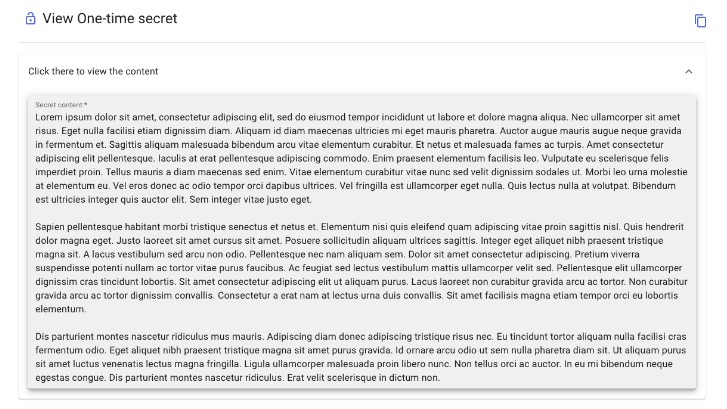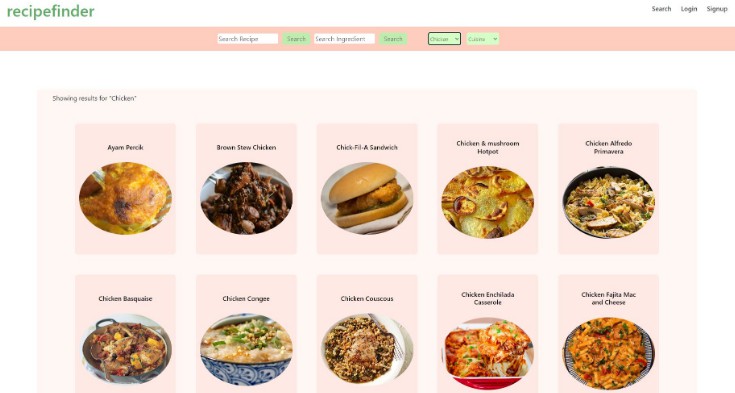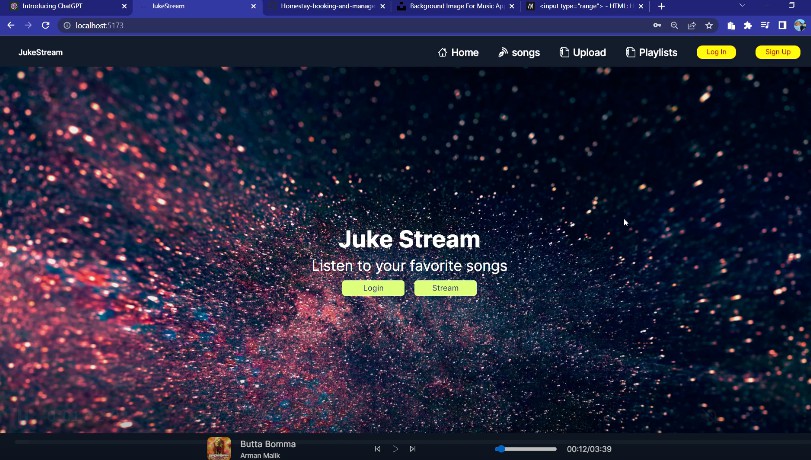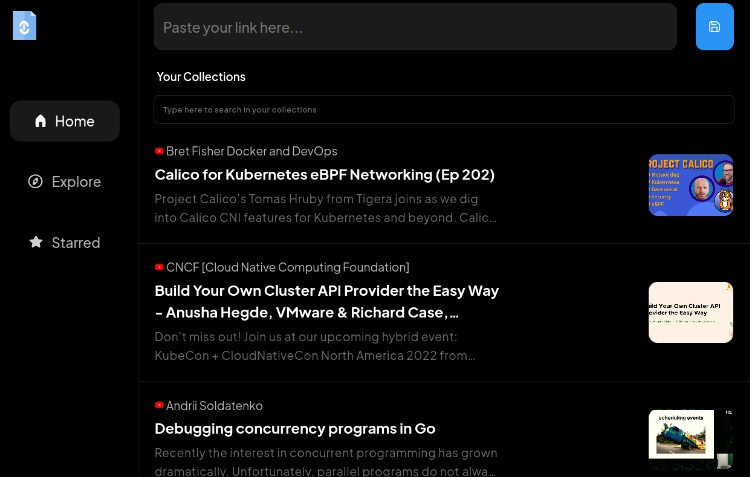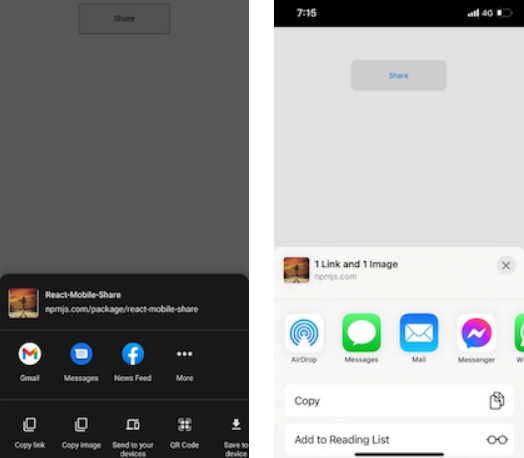OTS-Share (One-Time Secret Share)
A self-hosting app to share secrets only one-time.
Features
- Creates shareable links which valid for a maximum of 24 hours.
- The contents are encrypted with
AESinCBCmode, with a256-bitkey. (Using Crypto-js) - Passwords are NOT sent to the backend server.
- The app periodically deletes encrypted content after it expires, and the encrypted content gets deleted once the web UI fetches it.
- CLI support.
- Multiple database connectivity support.
MongoPostgresMySQL
How to execute
With the default database
This application is entirely run in Docker and comes with Mongo 4.2 image. (view the docker-compose.yml for further reference.)
To execute this app, simply run following command.
make start
Without the default database
This application can connect to a external database.
(Currently support Postgres and Mysql).
To execute this app, simply run following command.
# Set the connection string to your database.
export DB_URL=mysql://root:[email protected]:3306/ots_share
make start-no-db
OR
Change the modify the DB_URL variable under ots-share-run-no-db service in docker-compose.yml,
and then run
make start-no-db
Access UI
After that, the application is accessible via http://localhost:8282
Request and Response
Request
Create record request body
A sample request body is as follows.
{
"content": "U2FsdGVkX1+XUedzb2748LeKmf9UpN9hVWjBDUwJfXs=",
"expireIn": {
"value": 10,
"unit": "minutes"
}
}
| Property | type | is required | purpose |
|---|---|---|---|
content |
string |
yes | Encrypted content |
expireIn |
object |
yes | Expiration configurations |
expireIn.value |
number |
yes | numerical value of expiration. E,g 1, 2 |
expireIn.unit |
enum ('days', 'hours') |
yes | Unit of expiration. |
-
Sample
Createrequest.
curl 'http://localhost:8282/api/record' -H 'Content-Type: application/json' \
--data-raw \
'{
"content" : "U2FsdGVkX1+bozD8VjexiUeHJ3BfdxrXCmRyai8V0hY=",
"expireIn": {
"value": 1,
"unit": "minutes"
}
}'
--compressed
-
Sample
GETrequest.
curl 'http://localhost:8282/api/record/b2nC422huavXfMs2DWZ2Z9' -H 'Content-Type: application/json'
Response
A sample record body is as follows.
{
"id": "iN2jS3y1pstio7JVXs1zLF",
"slug": "iN2jS3y1pstio7JVXs1zLF",
"content": "U2FsdGVkX1+XUedzb2748LeKmf9UpN9hVWjBDUwJfXs=",
"expiary": "2023-02-12T14:55:41.510Z",
"status": "avaiable",
"created_at": "2023-02-12T14:45:41.521Z"
}
| Property | type | is required | purpose |
|---|---|---|---|
id |
string |
yes | Primary key of the record |
slug |
string |
yes | For future use (Primary key of the record) |
content |
string |
yes | Encrypted content |
expiary |
string (Date) |
yes | Expiration date and time |
status |
enum ('avaiable', 'unavaiable') |
yes | For future use. |
created_at |
string (Date) |
yes | Record created date |
How to use
(Please don’t lose the generated URL. There is no way to retrieve the content or regenerate the URL !!!)
Create shareable secret
- Add your secret content to the
Secret contenttext box.
- (Please don’t lose the generated URL. There is no way to retrieve the content or regenerate the URL !!!)
- Send the copied URL to the other party via a secure channel.
View secret content in the shared link.
-
Visit the shared link using a browser.
-
Click
Fetch Content. -
Click the
Click there to view the content.
Errors.
In case of an error, the following screen will appear.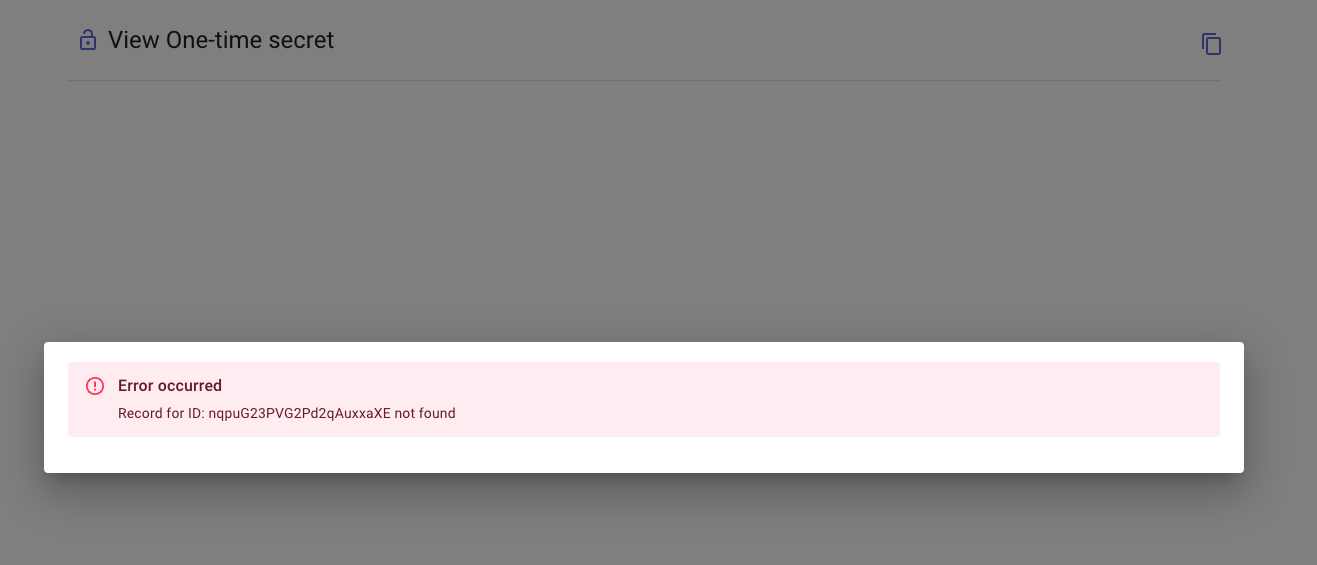
CLI usage
You can use the CLI to utilize APIs.
- Encryption using CLI
Sample CLI to use encryption
#!/bin/bash
# Configs
PASSWORD="pass-key"
OTS_SHARE_DOMIN="http://host.docker.internal:8282"
OTS_SHARE_API="$OTS_SHARE_DOMIN/api/record"
OPENSSL_PARAMETERS_PASSWORD="-pass pass:$PASSWORD"
OPENSSL_PARAMETERS_ALGORITHM="-base64 -aes-256-cbc -pbkdf2"
text_to_encrypt="test string to encrypt"
################
## Encryption ##
################
# Record expiration value. A numerical value
RECORD_EXPIRATION_VALUE=10
# Record expiration unit. It can be "minutes" or "hours"
RECORD_EXPIRATION_UNIT="minutes"
# 1. Generate encrypted string
encrypted_content=$(echo $text_to_encrypt | openssl enc -e $OPENSSL_PARAMETERS_ALGORITHM $OPENSSL_PARAMETERS_PASSWORD)
# 2. Make API call OTS-Share and retrieve the Id
# We need this id for encryption
record_id=$(\
curl -s "$OTS_SHARE_API" \
-H 'Content-Type: application/json' \
--data-raw \
'{ "content" : "'$encrypted_content'", "expireIn": { "value": '$RECORD_EXPIRATION_VALUE', "unit": "'$RECORD_EXPIRATION_UNIT'" }}' \
--compressed \
| jq '.id' \
| tr -d '"' \
)
#### Encryption results
echo "!!! Keep these safe !!!"
echo "-----------------------------------"
echo "Record id: $record_id"
echo "Password: $PASSWORD"
echo "-----------------------------------"
echo "(This record will expires in: $RECORD_EXPIRATION_VALUE $RECORD_EXPIRATION_UNIT)"
Output encryption
!!! Keep these safe !!!
-----------------------------------
Record id: b2nC422huavXfMs2DWZ2Z9
Password: pass-key
-----------------------------------
(This record will expires in: 10 minutes)
- Decryption using CLI
Sample CLI to use Decryption
#!/bin/bash
# Configs
PASSWORD="pass-key"
OTS_SHARE_DOMIN="http://host.docker.internal:8282"
OTS_SHARE_API="$OTS_SHARE_DOMIN/api/record"
OPENSSL_PARAMETERS_PASSWORD="-pass pass:$PASSWORD"
OPENSSL_PARAMETERS_ALGORITHM="-base64 -aes-256-cbc -pbkdf2"
$record_id="b2nC422huavXfMs2DWZ2Z9" # ID from previous encryption operation
################
## DECRYPTION ##
################
# 1. Fetch content
content=$(\
curl "$OTS_SHARE_API/$record_id" \
-s -H 'Content-Type: application/json' \
--compressed \
| jq '.content' \
| tr -d '"' \
)
# 2. Decrypt
decrypted_content=$(echo $content | openssl enc -d $OPENSSL_PARAMETERS_ALGORITHM $OPENSSL_PARAMETERS_PASSWORD)
echo "-----------------------------------"
echo "Content: $decrypted_content"
echo "-----------------------------------"
Output decryption
-----------------------------------
Content: test string to encrypt
-----------------------------------
Change configurations
All the configurations are mentioned in the docker-compose.yml under or ots-share-run-no-db service.
- Change default port to access the application are available in
docker-compose.yml under ots-share-run or ots-share-run-no-db service.
- You can modify the
mongo-local service in docker-compose.yml to keep the data persistent.
Change database server.
-
Please change the DEV_PORT variable the docker-compose.yml under ots-share-run or ots-share-run-no-db service.
-
Please change the DEV_PORT variable the docker-compose.yml under ots-share-run-no-db service to connect to external database.
-
DB_URL must be a connection string.
- The app parse the
DB_URL as an URL and use the protocol to identify the database driver.
- sample connection strings:
mongodb://mongo-local/ots-share – for Mongopostgres://db:[email protected]:5432/ots_share – for Postgresmysql://root:[email protected]:3306/ots_share – for MySQL
Change the default server port.
- Please change
SERVER_PORT variable in the in docker-compose.yml under ots-share-run or ots-share-run-no-db service.
Change the purge process interval.
- Default value is 1 minute.
- Please set
PURGE_TRIGGER_INTERVAL variable in the in docker-compose.yml under ots-share-run or ots-share-run-no-db service.
- The
PURGE_TRIGGER_INTERVAL value must be in milliseconds.
Tech stack
-
UI:
- React
- Material UI
-
Server:
- Typescript
- Node
- Express
-
DB support:
MongoDB – (default DB)PostgresMySQL
Format of the generated URL
docker-compose.yml under or ots-share-run-no-db service.docker-compose.yml under ots-share-run or ots-share-run-no-db service.mongo-local service in docker-compose.yml to keep the data persistent.Please change the DEV_PORT variable the docker-compose.yml under ots-share-run or ots-share-run-no-db service.
Please change the DEV_PORT variable the docker-compose.yml under ots-share-run-no-db service to connect to external database.
DB_URL must be a connection string.
- The app parse the
DB_URLas anURLand use theprotocolto identify thedatabasedriver. - sample connection strings:
mongodb://mongo-local/ots-share– forMongopostgres://db:[email protected]:5432/ots_share– forPostgresmysql://root:[email protected]:3306/ots_share– forMySQL
SERVER_PORT variable in the in docker-compose.yml under ots-share-run or ots-share-run-no-db service.PURGE_TRIGGER_INTERVAL variable in the in docker-compose.yml under ots-share-run or ots-share-run-no-db service.PURGE_TRIGGER_INTERVAL value must be in milliseconds.UI:
- React
- Material UI
Server:
- Typescript
- Node
- Express
DB support:
MongoDB– (default DB)PostgresMySQL
The URL format, which required sending to the other party, is as follows. The id received from the backend API gets concatenated with the password. After that, the contaminated string gets encoded into Base 58.
The format is as follows.
-
<hosted-domain>/r/Base58Encoded(id-from-api : password) -
It supports
Base 64encoding now.
Road map
- A Chrome extension
- A Slack app
- Support files
Todo
- Add
Contributioninstructions. - Add tests.
- Learn more ReactJs. 😄
- Fix any bugs. 😄
